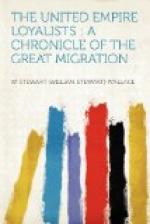When the terms of peace were announced, great was the bitterness among the Loyalists. One of them protested in Rivington’s Gazette that ’even robbers, murderers, and rebels are faithful to their fellows and never betray each other,’ and another sang,
’Tis an honour to serve the
bravest of nations,
And be left to be hanged in their
capitulations.
If the terms of the peace had been observed, the plight of the Loyalists would have been bad enough. But as it was, the outcome proved even worse. Every clause in the treaty relating to the Loyalists was broken over and over again. There was no sign of an abatement of the popular feeling against them; indeed, in some places, the spirit of persecution seemed to blaze out anew. One of Washington’s bitterest sayings was uttered at this time, when he said of the Loyalists that ’he could see nothing better for them than to commit suicide.’ Loyalist creditors found it impossible to recover their debts in America, while they were themselves sued in the British courts by their American creditors, and their property was still being confiscated by the American legislatures. The legislature of New York publicly declined to reverse its policy of confiscation, on the ground that Great Britain had offered no compensation for the property which her friends had destroyed. Loyalists who ventured to return home under the treaty of peace were insulted, tarred and feathered, whipped, and even ham-strung. All over the country there were formed local committees or associations with the object of preventing renewed intercourse with the Loyalists and the restitution of Loyalist property. ’The proceedings of these people,’ wrote Sir Guy Carleton, ’are not to be attributed to politics alone—it serves as a pretence, and under that cloak they act more boldly, but avarice and a desire of rapine are the great incentives.’




